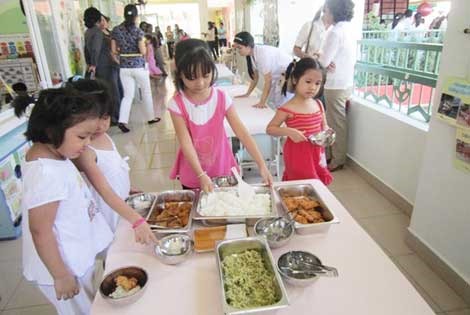 Society
Society

HCM City is helping schools link up with food producers who meet Vietnamese good agricultural practices (GAP) standards to safeguard students’ health and safety.
 |
| Officials say getting safe foods is not by itself enough to avoid food poisoning and school managers should pay attention to handling and storing them.— Photo cand.com.vn |
HCM CITY — HCM City is helping schools link up with food producers who meet Vietnamese good agricultural practices (GAP) standards to safeguard students’ health and safety.
The two sides have been unable to establish links on their own, according to the municipal Department of Agriculture and Rural Development.
The department and the Department of Education and Training have held many workshops this year to acquaint schools with safe agricultural products in the city.
The workshops attracted educational officials from districts, companies supplying agricultural products and managers as well as teachers from kindergartens and primary and secondary schools that provide lunch for their students.
At one of the workshops, Nguyễn Thị Thảo, a teacher at a kindergarten in District 1, said misgivings about unsafe foods are widespread and schools are worried about buying them.
They would be happy to know which companies produce foods meeting VietGap standards so that they could keep their children safe, she added.
Other teachers suggested taking school managers to food companies’ plants to see for themselves.
Đào Thanh Đức of Phước An Agriculture Co-operative, which grows vegetables in Bình Chánh District, said its prices are VNĐ3,000 lower per kilogramme than market rates.
The co-operative sells vegetable to 10 schools, but through a delivery establishment because the schools order vegetables together with meat and other stuff, he said.
Moreover, the Department of Agriculture and Rural Development runs many training courses to help teachers identify safe food and handle and store food properly to avoid bacterial contamination.
Huỳnh Thị Kim Cúc, deputy head of the agriculture department, said getting safe food by itself is not enough to avoid food poisoning and school managers should pay attention to handling and storing them.
Nguyễn Thị Huỳnh Mai, deputy head of the Food Safety and Hygiene Division, said there were five cases of mass food poisoning in the first four months of this year alone whereas there were only six in the whole of last year.
Of the five, more than half occurred at schools and due to bacterial contamination during processing, she said.
Twenty-four per cent was because of improper food storage, she added.
Only 1,620 schools have kitchens with the remaining 318 buying cooked food from suppliers. —VNS